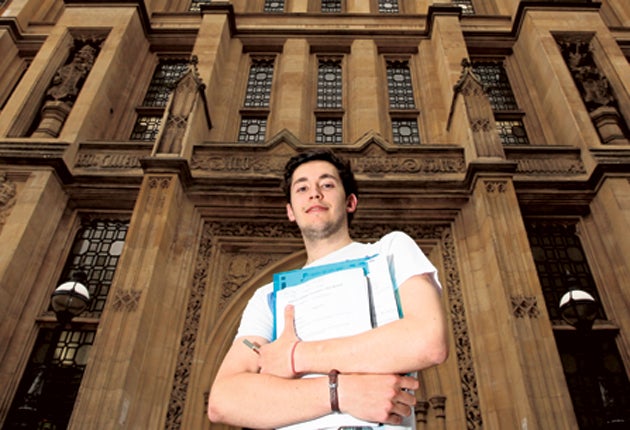Sixth of students regret going to university

One in six students would have reconsidered going to university if they had known how difficult it would be to secure a job once they graduated, a study has found.
The survey of 16,000 students in the final year of their degree course also found that just 36 per cent were likely to find a graduate job once their course was completed.
Sandy Chidley, 22, who is reading French and Hispanic at King's College London, is a case in point. "One of my friends left school and entered the City straight away and is faring well thus far," he said yesterday. "He seems to be no less disadvantaged by not having a degree – leaving us graduates with three years of further education and a mountain of debt."
He said he had been influenced by the thought that a degree guaranteed a job and a decent starting salary. "This seems not to be the case," he said.
Mark Wiseman, 22, who is studying maths at Queens' College, Cambridge, has tried in vain to seek a job as an actuary when he leaves the leafy spires of his university this summer.
He has applied for six or seven jobs and said that most of his friends were in a similar situation. However, he is adamant that his university experience has not been a waste of time and has taken the option of spending a fourth year at Cambridge to do a master's degree.
The survey, by the graduate recruitment company High Fliers Research, found that just over a third of those finishing university this summer expect to find a graduate job. The competition is especially fierce because they are up against many graduates from last year who have still not found graduate-related employment.
The survey's findings provide food for thought for the inquiry into student finance set up by the last government under the chairmanship of the former BP chief executive Lord Browne.
His committee has heard pleas from the Russell Group, which represents 20 leading higher education research institutions including Oxford and Cambridge, for the current £3,225-a-year cap on top-up fees to be lifted altogether, giving universities the right to charge whatever they want.
Other vice-chancellors have called for the inquiry to recommend a substantial increase in the cap when it reports next year. Part of the rationale behind charging students more is that those who benefit from inflated salaries after going through higher education should pay more towards its cost.
Martin Birchall, the managing director of High Fliers Research, says that argument might have been sustained 10 or 15 years ago but it is no longer relevant. "A small percentage can still earn high salaries by going to big firms like JP Morgan, Rolls-Royce et cetera – but unfortunately it's only the top 10 to 15 per cent who can look forward to that," he said.
Currently, there are 300,000 graduates leaving university every year – twice as many as in the early 1990s – and even in a good year there are only 150,000 graduate jobs, he said.
David Willetts, the universities Secretary, added: "The jobs market continues to be very tough for young people, who were among the biggest losers during the recession."
Case study: 'Your degree doesn't guarantee a job'
Sandy Chidley, 21
Mr Chidley is one of many students questioning whether their decision to go to university was the correct one.
The undergraduate, who is taking a French and Hispanic studies degree at King's College London, has seen friends who went straight out to work after leaving school successfully land jobs before the recession began to bite – giving them a distinct advantage over those who chose to spend three or four years studying at university instead.
"One of my friends left school and entered the City straight away and is faring well so far," he said. "He doesn't seem to be been disadvantaged by not having a degree, leaving us graduates with three years of further education and a mountain of debt."
Mr Chidley was persuaded going to university would lead to the guarantee of a job and a decent starting salary. "However, that seems not to be the case," he said.
Instead, he says, he is competing for jobs not only against his fellow graduates this summer "but also those from the year before and the year before that".
"I won't leave university now I have started," he added, "but those who are thinking of going to university should not bank on their degree guaranteeing them a job after they graduate."
He said that – instead of getting a degree – the way to succeed seemed to be "to pad your CV out with as many internships as possible, while all the time you cross your fingers and hope for something to crop up".
He believes that getting a degree no longer seemed to separate "the bright, the talented and hard-working" students from the rest of the crop, as it might once have done.
Join our commenting forum
Join thought-provoking conversations, follow other Independent readers and see their replies
Comments